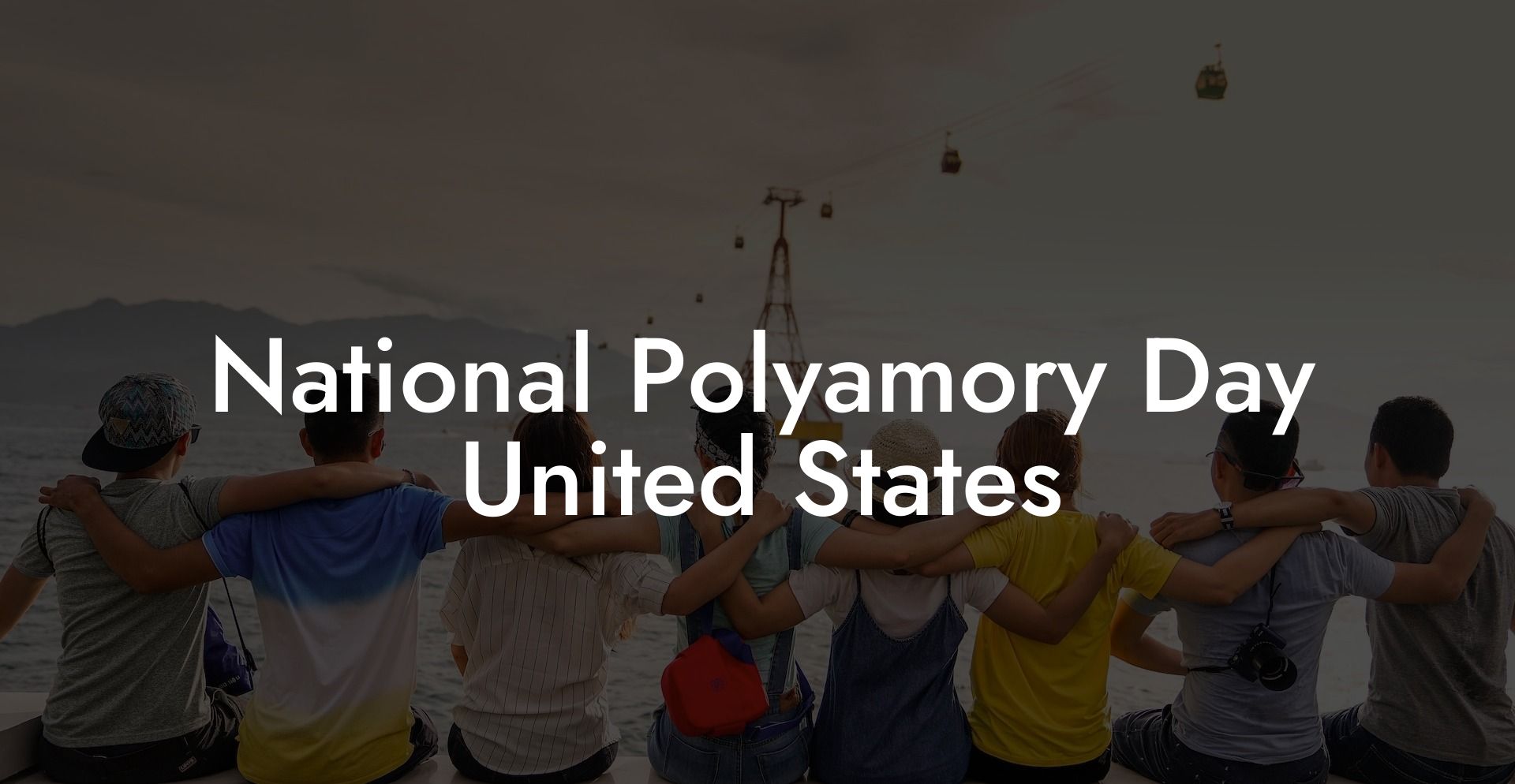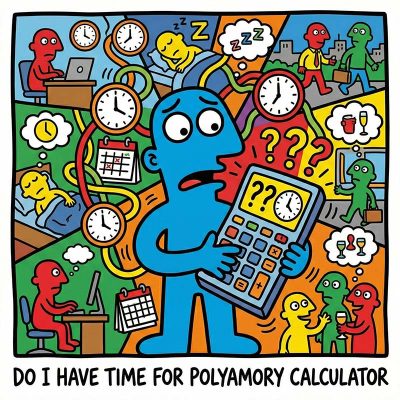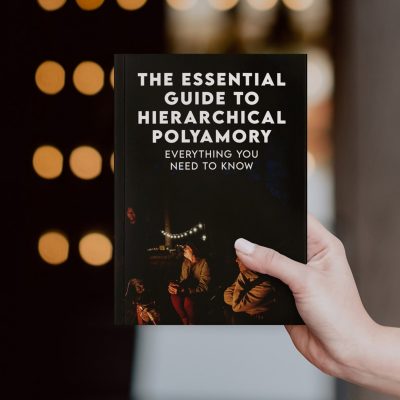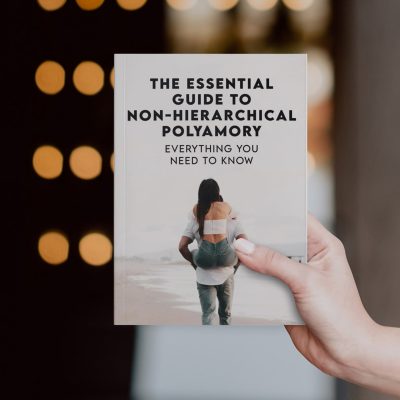Guide to National Polyamory Day United States

National Polyamory Day 23rd November in the United States, is a celebration of love in its most expansive and diverse forms, a day dedicated to recognizing and honoring the practice of forming multiple, consensual, and meaningful relationships. As societal norms evolve and people increasingly seek alternatives to traditional monogamy, this day serves not only as a celebration of polyamorous lifestyles but also as an educational opportunity. Whether you identify as polyamorous, are curious about the lifestyle, or are simply an ally interested in supporting diverse relationship models, this guide will walk you through the history, significance, and ways to celebrate National Polyamory Day in the United States. Read on to discover practical tips, real-life insights, and expert advice on how to engage with this vibrant, growing community.
Quick Links to Useful Sections
- Understanding National Polyamory Day
- A Brief History of National Polyamory Day
- The Significance of National Polyamory Day
- How to Celebrate National Polyamory Day
- Cultural and Social Impact of National Polyamory Day
- Tips for Allies and Educators
- FAQ: How to Explain Polyamory to a Monogamous Person
- Resources and Community Support
Understanding National Polyamory Day
National Polyamory Day is observed annually as a way to increase awareness and acceptance of polyamorous relationships, a model of ethical non-monogamy where individuals engage in multiple romantic or sexual relationships with the full consent and knowledge of everyone involved. It is a day for open dialogue, education, and celebration of the diversity of human connections. Unlike secretive or deceptive forms of non-monogamy, polyamory is rooted in transparency, consent, and continuous communication.
The day provides an opportunity for polyamorous individuals and couples to come together, share their experiences, and advocate for more inclusive relationship models. It also serves as a platform for allies and educators to dispel common misconceptions about polyamory, highlighting that it is not about promiscuity but about forming deep, ethical, and consensual relationships that reflect the reality of modern love.
A Brief History of National Polyamory Day
Although there isn’t a single origin story for National Polyamory Day, its roots can be traced back to the broader movement for ethical non-monogamy that began gaining visibility in the late 20th century. As cultural attitudes shifted during the 1960s and 1970s, with the sexual revolution and the feminist movement challenging traditional norms, more people began questioning the assumption that monogamy was the only valid form of relationship.
Over time, literature such as "The Ethical Slut" and "More Than Two" helped codify the principles of polyamory, emphasizing the importance of consent, communication, and mutual respect. As more individuals embraced these ideas, National Polyamory Day emerged organically as a way to celebrate and promote these values. Today, it stands as a symbol of acceptance and a reminder that love can be experienced in many different, fulfilling ways.
Early advocates used social media, grassroots organizing, and online forums to spread the word, and now the day is celebrated through local meet-ups, educational events, panel discussions, and community celebrations across the United States.

Love is infinite, but your calendar is brutally finite. The fantasy is deep connection; the reality is often just exhausted "calendar tetris." Promising time you don't actually have isn't romantic, it’s a recipe for burnout and broken trust. That sinking feeling when you have to cancel again? That’s the sound of overextension destroying your relationships.
This calculator forces you to confront the math of your life. Do you actually have space for another heart, or are you just setting everyone up for disappointment?

The fantasy is total autonomy and connection. The reality? It can feel like drowning in scheduling chaos and misunderstood expectations. That anxiety you feel isn’t just stress; it’s the wobble of living without a default "anchor." Without a solid architecture, Solo Polyamory stops being a life design and starts being a recipe for burnout and confusion.
The Essential Guide replaces the drift with a concrete anchor. We provide the "Solo Ethic," boundary scripts, and burnout protocols needed to protect your peace. Don't just date around—build a life that actually works for you.

Hierarchy sounds like a corporate org chart until someone gets their feelings hurt. That stomach-turning fear that you are just a "secondary" who can be fired at any time is real. If your relationship feels like a secret ranking system, you are doing it wrong.
Ambiguity is where resentment grows. The Essential Guide replaces the "who matters more" panic with a concrete charter. We provide the scripts and equity guardrails needed to protect every heart in the polycule. Stop guessing and start building.

The ideal is pure equality. The reality? It often slides into hidden rankings where someone gets hurt. That sinking feeling that you are secretly a "secondary" despite the label? That is your intuition detecting couple privilege. Ambiguity is where resentment thrives.
The Essential Guide replaces vague promises with concrete governance. We provide the charters, equity tools, and jealousy protocols needed to ensure "non-hierarchical" isn't just a fantasy. Stop guessing who matters most. Build a network that is actually fair.

The fantasy is total autonomy and connection. The reality? It can feel like drowning in scheduling chaos and misunderstood expectations. That anxiety you feel isn’t just stress; it’s the wobble of living without a default "anchor." Without a solid architecture, Solo Polyamory stops being a life design and starts being a recipe for burnout and confusion.
The Essential Guide replaces the drift with a concrete anchor. We provide the "Solo Ethic," boundary scripts, and burnout protocols needed to protect your peace. Don't just date around—build a life that actually works for you.

Hierarchy sounds like a corporate org chart until someone gets their feelings hurt. That stomach-turning fear that you are just a "secondary" who can be fired at any time is real. If your relationship feels like a secret ranking system, you are doing it wrong.
Ambiguity is where resentment grows. The Essential Guide replaces the "who matters more" panic with a concrete charter. We provide the scripts and equity guardrails needed to protect every heart in the polycule. Stop guessing and start building.
The Significance of National Polyamory Day
National Polyamory Day holds deep significance for several reasons:
- Visibility and Awareness: By celebrating polyamory publicly, the day challenges prevailing myths and stereotypes, fostering greater understanding and acceptance of non-traditional relationship models.
- Community Building: It provides a space for polyamorous individuals, couples, and allies to connect, share experiences, and support each other, strengthening the overall community.
- Education: The day serves as an educational platform, offering workshops, panel discussions, and online resources that help demystify polyamory and provide practical advice on how to navigate the lifestyle.
- Advocacy for Inclusivity: National Polyamory Day promotes the idea that all forms of consensual love deserve recognition and respect, contributing to broader social and legal discussions about relationship diversity.
Celebrating this day helps shift public perceptions, making it easier for people to embrace and understand polyamorous relationships without judgment.
How to Celebrate National Polyamory Day
There are many ways to celebrate National Polyamory Day, whether you are actively involved in polyamory or simply want to support the community. Here are several ideas to get you started:
- Attend Community Events: Look for local meet-ups, workshops, or panel discussions focused on polyamory and ethical non-monogamy. These events provide an excellent opportunity to learn, share, and connect with like-minded individuals.
- Participate in Online Forums and Social Media: Join online communities on platforms like Reddit (e.g., r/polyamory) or Facebook groups dedicated to polyamory. Share your experiences, ask questions, and help educate others about the benefits and challenges of non-monogamous relationships.
- Host or Join a Virtual Celebration: If local events aren’t available, consider organizing or attending a virtual celebration. This could be a video call where participants share personal stories, discuss educational topics, or simply enjoy a social gathering in a safe, online space.
- Educate Yourself and Others: Use the day as an opportunity to read books, watch documentaries, or listen to podcasts about polyamory. Then, share what you learn with friends, family, or colleagues who may be interested in understanding more about ethical non-monogamy.
- Create Art or Content: Express your experiences and perspectives through creative outlets like writing, photography, or art. Consider starting a blog, posting on social media, or even creating a video that highlights the beauty and complexity of polyamorous relationships.
- Advocate for Inclusivity: Use the day as a platform to promote discussions about relationship diversity. Write op-eds, share informative articles, or engage in public discussions that challenge traditional norms and highlight the legitimacy of multiple forms of love.
No matter how you choose to celebrate, the goal is to honor the values of honesty, consent, and mutual respect that are at the heart of polyamory, while also contributing to a broader cultural shift toward acceptance and inclusivity.
Cultural and Social Impact of National Polyamory Day
National Polyamory Day has far-reaching cultural and social implications. As more people participate and share their experiences, the day contributes to a growing movement that challenges conventional relationship norms and advocates for greater freedom of expression in love. This increased visibility helps:
- Break Down Stereotypes: By showcasing the diverse ways in which people experience love, National Polyamory Day dispels myths that equate polyamory with promiscuity or lack of commitment.
- Promote Inclusivity: The celebration fosters a more inclusive understanding of relationships, encouraging society to accept and validate a range of relationship models.
- Influence Legal and Social Reforms: As polyamorous relationships gain visibility, there is growing advocacy for legal recognition and protections for non-traditional relationship models.
- Empower Individuals: For many, the day is a source of personal empowerment, a reminder that they have the right to love authentically, without judgment or societal constraints.
Through these cultural shifts, National Polyamory Day plays a crucial role in redefining what it means to be in a relationship in the modern world.
Tips for Allies and Educators
Even if you do not personally practice polyamory, you can play an important role in supporting and educating others. Here are some tips for allies and educators:
- Listen Actively: Take the time to understand the experiences and perspectives of polyamorous individuals without judgment.
- Educate Yourself: Familiarize yourself with the core principles and common misconceptions about polyamory. Read books, listen to podcasts, and engage with reputable online communities.
- Use Inclusive Language: When discussing relationships, use language that respects all forms of love and commitment. Avoid assumptions that all relationships should follow a monogamous model.
- Support Open Dialogue: Encourage conversations about relationship diversity in your social circles, workplaces, and community forums. Sharing information and personal stories can help normalize polyamory.
- Advocate for Change: Support policies and initiatives that promote inclusivity and legal recognition for non-traditional relationships. Your advocacy can contribute to broader societal acceptance.
By acting as an informed ally, you help create a more inclusive environment where everyone’s relationship choices are respected.
FAQ: How to Explain Polyamory to a Monogamous Person
1. What is polyamory?
Polyamory is the practice of engaging in multiple consensual romantic or sexual relationships simultaneously, with full transparency and mutual respect among all parties involved.
2. How is polyamory different from infidelity?
Unlike infidelity, which involves secrecy and betrayal, polyamory is based on open communication and informed consent, ensuring that all partners are aware and supportive of the relationship dynamics.
3. Can love be shared without being diminished?
Yes, many believe that love is an abundant resource that can grow when shared among multiple partners. Instead of diminishing, diverse relationships can enrich your emotional life.
4. Is polyamory just about having casual hookups?
Not at all. While some polyamorous relationships are casual, many involve deep emotional bonds and long-term commitments. It’s about forming meaningful connections on your own terms.
5. How do polyamorous people manage jealousy?
Polyamorous individuals address jealousy through open, honest communication, regular check-ins, and self-reflection. Many also seek professional guidance when needed.
6. What are the benefits of polyamory?
Benefits include diverse emotional support, personal growth, enhanced communication skills, and the flexibility to form relationships that cater to different aspects of your personality.
7. What challenges might someone in a polyamorous relationship face?
Common challenges include managing time and energy among multiple relationships, negotiating boundaries, and dealing with societal stigma. These challenges can be mitigated through effective communication and mutual respect.
8. How important is communication in polyamory?
Communication is absolutely essential. Open dialogue helps ensure that all partners’ needs and boundaries are respected and that any issues are addressed promptly.
9. Can polyamory work for everyone?
No single relationship model is for everyone. Polyamory requires a high level of self-awareness, excellent communication skills, and a willingness to manage complex emotions.
10. Where can I learn more about polyamory?
Books like "The Ethical Slut" and "More Than Two", podcasts such as “Multiamory,” and online communities like Reddit’s r/polyamory provide valuable insights and support.
Resources and Community Support
- Books and Articles: Explore foundational texts such as "The Ethical Slut" and "More Than Two" to deepen your understanding of polyamory and its benefits.
- Podcasts: Listen to shows like “Multiamory” for personal experiences, expert advice, and practical tips on navigating multiple relationships.
- Online Communities: Engage with supportive groups on platforms like Reddit’s r/polyamory and dedicated Facebook groups for shared insights and advice.
- Workshops and Events: Attend local meet-ups or workshops that focus on ethical non-monogamy to connect with like-minded individuals and gain practical guidance.
- Therapy and Counseling: Consider consulting a therapist or relationship coach specializing in polyamory to help you manage complex emotions and build strong, healthy connections.
With thoughtful self-reflection, effective communication, and the support of a vibrant community, you can embrace modern polyamory and build relationships that are as enriching and authentic as they are diverse.

Love is infinite, but your calendar is brutally finite. The fantasy is deep connection; the reality is often just exhausted "calendar tetris." Promising time you don't actually have isn't romantic, it’s a recipe for burnout and broken trust. That sinking feeling when you have to cancel again? That’s the sound of overextension destroying your relationships.
This calculator forces you to confront the math of your life. Do you actually have space for another heart, or are you just setting everyone up for disappointment?

The fantasy is total autonomy and connection. The reality? It can feel like drowning in scheduling chaos and misunderstood expectations. That anxiety you feel isn’t just stress; it’s the wobble of living without a default "anchor." Without a solid architecture, Solo Polyamory stops being a life design and starts being a recipe for burnout and confusion.
The Essential Guide replaces the drift with a concrete anchor. We provide the "Solo Ethic," boundary scripts, and burnout protocols needed to protect your peace. Don't just date around—build a life that actually works for you.

Hierarchy sounds like a corporate org chart until someone gets their feelings hurt. That stomach-turning fear that you are just a "secondary" who can be fired at any time is real. If your relationship feels like a secret ranking system, you are doing it wrong.
Ambiguity is where resentment grows. The Essential Guide replaces the "who matters more" panic with a concrete charter. We provide the scripts and equity guardrails needed to protect every heart in the polycule. Stop guessing and start building.

The ideal is pure equality. The reality? It often slides into hidden rankings where someone gets hurt. That sinking feeling that you are secretly a "secondary" despite the label? That is your intuition detecting couple privilege. Ambiguity is where resentment thrives.
The Essential Guide replaces vague promises with concrete governance. We provide the charters, equity tools, and jealousy protocols needed to ensure "non-hierarchical" isn't just a fantasy. Stop guessing who matters most. Build a network that is actually fair.

The fantasy is total autonomy and connection. The reality? It can feel like drowning in scheduling chaos and misunderstood expectations. That anxiety you feel isn’t just stress; it’s the wobble of living without a default "anchor." Without a solid architecture, Solo Polyamory stops being a life design and starts being a recipe for burnout and confusion.
The Essential Guide replaces the drift with a concrete anchor. We provide the "Solo Ethic," boundary scripts, and burnout protocols needed to protect your peace. Don't just date around—build a life that actually works for you.

Hierarchy sounds like a corporate org chart until someone gets their feelings hurt. That stomach-turning fear that you are just a "secondary" who can be fired at any time is real. If your relationship feels like a secret ranking system, you are doing it wrong.
Ambiguity is where resentment grows. The Essential Guide replaces the "who matters more" panic with a concrete charter. We provide the scripts and equity guardrails needed to protect every heart in the polycule. Stop guessing and start building.
Aging And Long Term Care Planning As Solo Poly
Attachment Styles And Solo Polyamory
Autonomy And Self Partnership As Foundations
Avoiding Avoidance Disguised As Autonomy
Avoiding Being Treated As An Accessory Relationship
Balancing Independence And Intimacy
Balancing Multiple Partners Without Burnout
Barrier Use Conversations With Multiple Partners
Boundaries Versus Rules In Solo Poly Relationships
Breakups And Grief While Staying Solo
Building Emotional Availability As Solo Poly
Caregiving And Illness Support Without A Nesting Partner
Co Parenting Agreements And Boundaries
Co Parenting And Family Building As Solo Poly
Coming Out As Solo Polyamorous
Common Mistakes Partners Make With Solo Poly People
Common Mistakes Solo Poly People Make
Common Myths About Solo Polyamory
Communication Check Ins That Fit Solo Poly
Community And Chosen Family For Solo Poly People
Compersion And Neutrality Toward Partner Dating
Conflict Resolution Without Couple Default
Core Values Of Solo Polyamory
Creating Agreements That Preserve Independence
Creating Secure Attachment Without Traditional Milestones
Dating People Who Want Escalation
De Escalation As A Healthy Choice
Decentering Couple Norms And Escalator Scripts
Deciding Whether Solo Polyamory Is Right For You
Defining Relationship Depth Without Shared Living
Defining Success Without Traditional Milestones
Designing A Sustainable Solo Poly Life
Digital Safety And Privacy
Disability And Access Needs As Solo Poly
Emergency Contacts And Support Planning
End Of Life Planning And Legal Documents
Energy Management And Overextension Risks
Financial Independence And Entanglement Decisions
Finding Solo Poly Friendly Community
Friendships As Core Support Structures
Gifts Trips And Resource Boundaries
Handling Being The Newest Partner
Handling Judgment From Monogamous Culture
Handling Judgment From Poly Communities
Handling Last Minute Plan Changes
Holidays And Special Occasions As Solo Poly
Housing Choices And Living Alone
How To Disclose Solo Polyamory Early While Dating
How To Explain Solo Polyamory To Partners
In Person Events And Support Networks
Intersectionality In Solo Poly Experiences
Long Distance Relationships And Solo Poly
Maintaining Rituals Without Domestic Integration
Maintaining Self Partnership Through Loss
Managing Insecurity Without Default Reassurance
Managing Metamour Dynamics Without Centering A Couple
Managing Nre Without Losing Yourself
Navigating Jealousy As A Solo Poly Person
Navigating Marriage Offers As Solo Poly
Navigating Partners With Nesting Or Spouses
Pacing New Connections Ethically
Parallel Versus Kitchen Table Preferences
Parenting Without A Primary Partner Model
Pregnancy And Fertility Conversations For Solo Poly
Privacy And Information Sharing Consent
Processing Loneliness While Staying Solo
Protecting Personal Time Without Withholding Connection
Quality Time When You Do Not Share A Home
Race Gender And Class Factors In Solo Poly
Religion Culture And Family Expectations
Relocation And Maintaining Connections
Repair After Misunderstandings With Partners
Responding To Requests For Primary Status
Risk Profiles And Informed Consent
Screening For People Who Respect Autonomy
Self Worth Outside Relationship Status
Setting Expectations With Highly Partnered People
Sexual Health Agreements As A Solo Poly Person
Shared Housing With Friends And Community
Signs Solo Polyamory Is Working Well
Social Media Boundaries And Visibility
Solo Polyamory And Career Mobility
Solo Polyamory And Commitment
Solo Polyamory And Mental Health Support
Solo Polyamory And Metamour Relationships
Solo Polyamory Versus Being Single
Solo Polyamory Versus Non Hierarchical Polyamory
Solo Polyamory Versus Relationship Anarchy
Substance Use Boundaries And Consent
Testing Schedules And Disclosure Practices
The History And Evolution Of Solo Polyamory
Therapy And Coaching For Solo Polyamory
Time And Scheduling As A Solo Poly Person
Transparency Without Being Managed
Travel And Overnights Without Implied Escalation
Warning Signs Of Isolation Masquerading As Autonomy
What Commitment Looks Like Without Nesting
What Solo Polyamory Is And What It Is Not
Why People Choose Solo Polyamory
Writing A Solo Poly Dating Profile
Accountability When Harm Occurs
Aging And Long Term Planning
Alternatives To Veto Policies
Attachment Styles And Hierarchy
Avoiding Disposable Partner Dynamics
Avoiding Entitlement In Primary Relationships
Avoiding Objectification And Ranking Language
Blended Families And Co Parenting Dynamics
Boundaries Versus Rules In Hierarchical Contexts
Caregiving And Illness Decisions
Choosing Hierarchy Intentionally
Common Challenges Faced By Secondary Partners
Common Mistakes Primary Partners Make
Common Mistakes Secondary Partners Make
Common Myths About Hierarchical Polyamory
Communicating Limits Without Devaluing Others
Community Perception Of Hierarchical Polyamory
Compersion When Time And Resources Are Unequal
Consent And Transparency In Hierarchy
Consent Under Unequal Power Dynamics
Cultural And Socioeconomic Influences On Hierarchy
De Escalation Without Punishment
Deciding Whether Hierarchical Polyamory Is Right For You
Decision Making Power In Primary Relationships
Descriptive Versus Prescriptive Hierarchy
Emotional Labor Distribution Across Partners
Emotional Regulation Skills For Hierarchical Dynamics
Emotional Safety For Non Primary Partners
Ending Relationships Ethically Within Hierarchy
Ethical Foundations Of Hierarchical Structures
Ethical Storytelling About Hierarchical Relationships
Ethical Use Of Veto Power
Fear Of Replacement Or Demotion
Financial Transparency With Multiple Partners
Handling Breakups Within A Hierarchical System
Hierarchy Versus Relationship Anarchy
Holidays Vacations And Special Occasions
How Hierarchical Polyamory Differs From Non Hierarchical Polyamory
How Hierarchical Polyamory Evolves Over Time
How Privilege Shows Up In Daily Decisions
How To Disclose Hierarchy Early In Dating
Inclusion Versus Exclusion Practices
Integrating Hierarchy With Personal Values
Integrating New Partners Ethically
Intersectionality And Power In Hierarchy
Jealousy In Hierarchical Polyamory
Legal Risks And Protections
Lessons Hierarchical Polyamory Teaches About Love
Letting Go Of Hierarchy When It No Longer Fits
Living Together Versus Living Apart
Long Distance Relationships Within Hierarchy
Managing Boundary Violations
Managing Comparison Between Partners
Marriage And Legal Privilege In Hierarchical Polyamory
Measuring Fulfillment Beyond Priority Status
Navigating Attachment As A Secondary Partner
Navigating Conflicts Between Partners At Different Levels
Navigating Judgment From Non Hierarchical Communities
Ongoing Check Ins Across Relationship Levels
Opening Or Closing The Hierarchy
Parenting And Family Planning Within Hierarchy
Power Imbalances Inherent In Hierarchy
Pregnancy And Parenting Transitions
Primary Secondary And Tertiary Relationship Definitions
Privacy And Information Flow
Re Negotiating Hierarchy After Major Life Events
Rebuilding Trust After Structural Changes
Renegotiating Primary Agreements Over Time
Repair Conversations After Hierarchical Tension
Repairing Harm Caused By Hierarchical Decisions
Resentment And Unspoken Grief
Responsibilities And Expectations Of Primary Partners
Rules That Protect Versus Rules That Control
Scheduling Fairness Versus Equality
Self Worth Outside Relationship Rank
Setting Clear Expectations With New Partners
Shared Finances And Resource Prioritization
Signs Hierarchy Is Functioning Well
Supporting Mental Health Across The Network
Supporting Secondary Partners Through Transitions
The Origins And History Of Hierarchical Polyamory
The Role Of Nesting Partners
Therapy And Coaching For Hierarchical Polyamory
Time Allocation And Scheduling Priorities
Transparency Without Oversharing
Treating All Partners As Whole People
Understanding Couple Privilege
Warning Signs Of Unhealthy Hierarchy
What Hierarchical Polyamory Is And What It Is Not
What It Means To Be A Primary Partner
What It Means To Be A Secondary Partner
What People Wish They Knew Earlier
What Success Looks Like In Hierarchical Polyamory
When Hierarchy Activates Past Trauma
When Hierarchy Becomes Coercive
When Hierarchy Emerges Without Intention
When Primary Relationships Change
When Professional Support Is Needed
When Secondary Relationships Deepen
Why Hierarchy Exists In Some Polyamorous Relationships
Accountability When Harm Occurs
Aging And Long Term Planning
Alternatives To Veto Policies
Attachment Styles And Hierarchy
Avoiding Disposable Partner Dynamics
Avoiding Entitlement In Primary Relationships
Avoiding Objectification And Ranking Language
Blended Families And Co Parenting Dynamics
Boundaries Versus Rules In Hierarchical Contexts
Caregiving And Illness Decisions
Choosing Hierarchy Intentionally
Common Challenges Faced By Secondary Partners
Common Mistakes Primary Partners Make
Common Mistakes Secondary Partners Make
Common Myths About Hierarchical Polyamory
Communicating Limits Without Devaluing Others
Community Perception Of Hierarchical Polyamory
Compersion When Time And Resources Are Unequal
Consent And Transparency In Hierarchy
Consent Under Unequal Power Dynamics
Cultural And Socioeconomic Influences On Hierarchy
De Escalation Without Punishment
Deciding Whether Hierarchical Polyamory Is Right For You
Decision Making Power In Primary Relationships
Descriptive Versus Prescriptive Hierarchy
Emotional Labor Distribution Across Partners
Emotional Regulation Skills For Hierarchical Dynamics
Emotional Safety For Non Primary Partners
Ending Relationships Ethically Within Hierarchy
Ethical Foundations Of Hierarchical Structures
Ethical Storytelling About Hierarchical Relationships
Ethical Use Of Veto Power
Fear Of Replacement Or Demotion
Financial Transparency With Multiple Partners
Handling Breakups Within A Hierarchical System
Hierarchy Versus Relationship Anarchy
Holidays Vacations And Special Occasions
How Hierarchical Polyamory Differs From Non Hierarchical Polyamory
How Hierarchical Polyamory Evolves Over Time
How Privilege Shows Up In Daily Decisions
How To Disclose Hierarchy Early In Dating
Inclusion Versus Exclusion Practices
Integrating Hierarchy With Personal Values
Integrating New Partners Ethically
Intersectionality And Power In Hierarchy
Jealousy In Hierarchical Polyamory
Legal Risks And Protections
Lessons Hierarchical Polyamory Teaches About Love
Letting Go Of Hierarchy When It No Longer Fits
Living Together Versus Living Apart
Long Distance Relationships Within Hierarchy
Managing Boundary Violations
Managing Comparison Between Partners
Marriage And Legal Privilege In Hierarchical Polyamory
Measuring Fulfillment Beyond Priority Status
Navigating Attachment As A Secondary Partner
Navigating Conflicts Between Partners At Different Levels
Navigating Judgment From Non Hierarchical Communities
Ongoing Check Ins Across Relationship Levels
Opening Or Closing The Hierarchy
Parenting And Family Planning Within Hierarchy
Power Imbalances Inherent In Hierarchy
Pregnancy And Parenting Transitions
Primary Secondary And Tertiary Relationship Definitions
Privacy And Information Flow
Re Negotiating Hierarchy After Major Life Events
Rebuilding Trust After Structural Changes
Renegotiating Primary Agreements Over Time
Repair Conversations After Hierarchical Tension
Repairing Harm Caused By Hierarchical Decisions
Resentment And Unspoken Grief
Responsibilities And Expectations Of Primary Partners
Rules That Protect Versus Rules That Control
Scheduling Fairness Versus Equality
Self Worth Outside Relationship Rank
Setting Clear Expectations With New Partners
Shared Finances And Resource Prioritization
Signs Hierarchy Is Functioning Well
Supporting Mental Health Across The Network
Supporting Secondary Partners Through Transitions
The Origins And History Of Hierarchical Polyamory
The Role Of Nesting Partners
Therapy And Coaching For Hierarchical Polyamory
Time Allocation And Scheduling Priorities
Transparency Without Oversharing
Treating All Partners As Whole People
Understanding Couple Privilege
Warning Signs Of Unhealthy Hierarchy
What Hierarchical Polyamory Is And What It Is Not
What It Means To Be A Primary Partner
What It Means To Be A Secondary Partner
What People Wish They Knew Earlier
What Success Looks Like In Hierarchical Polyamory
When Hierarchy Activates Past Trauma
When Hierarchy Becomes Coercive
When Hierarchy Emerges Without Intention
When Primary Relationships Change
When Professional Support Is Needed
When Secondary Relationships Deepen
Why Hierarchy Exists In Some Polyamorous Relationships
Lost & confused by all of the terms, types and seemingly made up 3 letter acronyms?? We've got you. Check out our Ethnical Non-Monogamy Dictionary >>
Useful Interruption: Not sure which relationship vibe fits you best? Take the Ultimate Relationship Test, it will give you details into your natural relationship style. Then, dive into our binge-worthy guides, from the tried-and-true to the “wait, that’s a thing?", and find the perfect relationship type for your life.
Now back to the main article but yeah take the Ultimate Relationship Test
